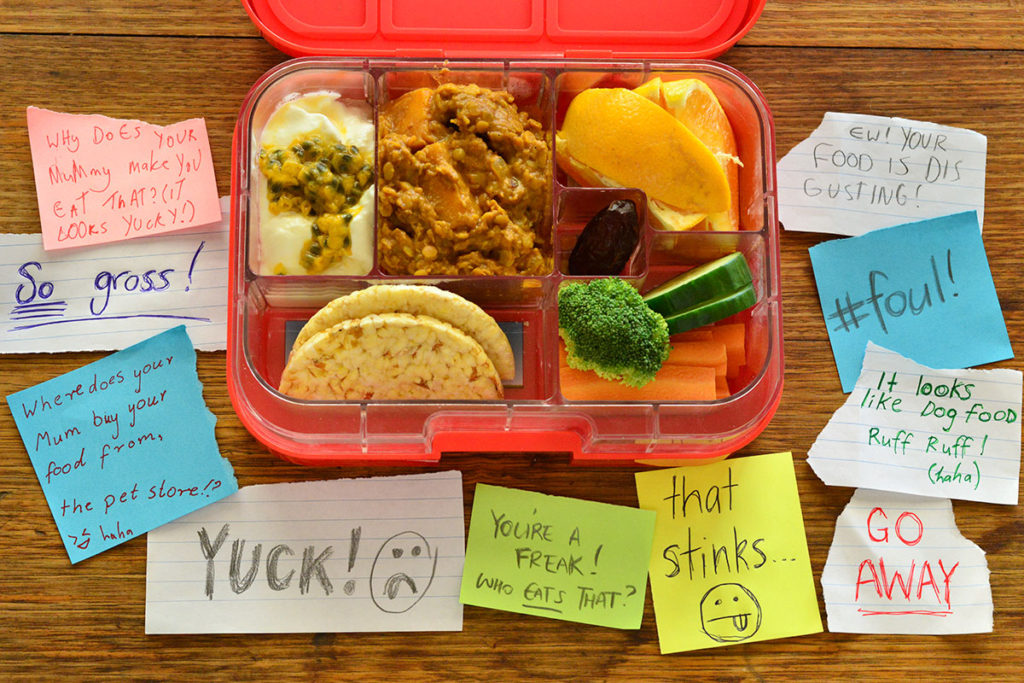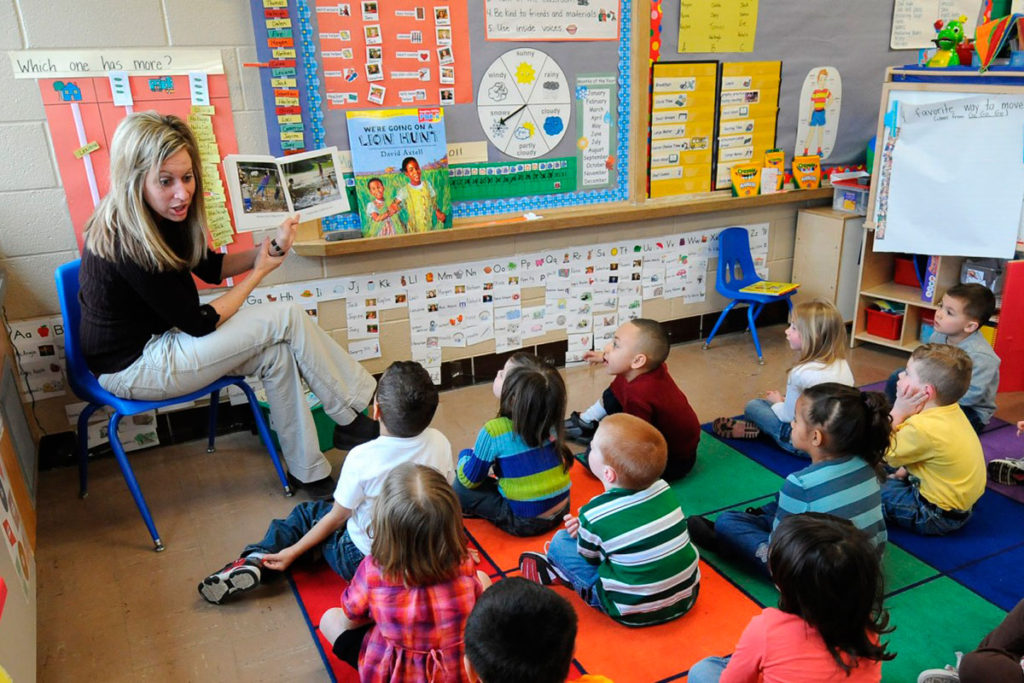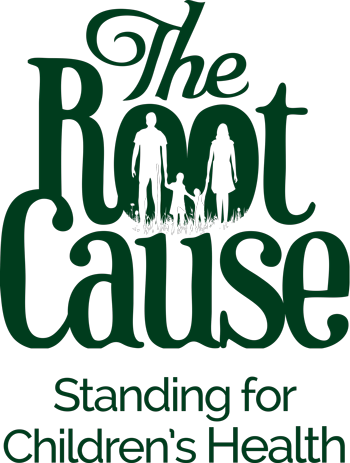
Ewww! That smells. Or That looks yuk! Have your kids ever been exposed to this when they open their lunchbox? Both of our two have been, and from stories other parents have told me, it’s not an uncommon event. I want to share with you how you can help your kids beat the lunchbox bullies.
The Problem Is This
Kids have a real desire and a need to fit in at school. What their peers say matters, even when it really shouldn’t. I am talking here about kids that get ridiculed because of the food they have in their lunchbox.
Over the past 12 months, we’ve spoken to over 10,000 children and parents and heard many issues they face when it comes to lunchbox foods, and eating in general. I have NEVER had a parent who puts packets in their child’s lunchbox say their child gets teased about the contents of their lunchbox. However, I have seriously lost track of the number of times parents have told me their kids get teased because they have real food lunchboxes.
Teasing is a form of bullying, regardless of what it’s about. Like other forms of schoolyard bullying, teasing about lunchboxes should not be tolerated.
For the kids doing the teasing, it may seem harmless, but for the kids on the receiving end, it hurts and can even have health impacts. For many of these kids, they have health issues which require them to eat a certain way.
For some kids, the desire to fit in is more important than eating, so they respond by closing their lunchbox and not eating. For other kids, they eat their food but take on those feelings of I’m different or I don’t fit in.
We need to empower our kids to feel confident enough to eat what’s in their lunchbox, regardless of what sort of food it is.

Lunchbox Bullies – Some Background
At a recent workshop I ran in Bridgetown WA, a mum asked me about what she can do to help her child who was getting teased about their healthy lunchbox. This teasing was coming from other kids. The mum explained she went to great lengths to make pack healthy lunchboxes, because her child had ADHD and food was an important means to managing behaviour. What was even more upsetting for this mum was that she felt her child’s teacher was adding to the situation, by saying things like this at classroom celebrations: “Oh, you poor thing, you can’t have this. Your mummy said you’re not allowed.”
I wish this was the first time I have heard this story, but it isn’t.
Every child is entitled to eat their lunchbox without feeling bad, regardless of what food is in it. Wouldn’t you agree?
For the parents who have made a choice to feed their kids real food, their children should not be made to feel as though they are being deprived or missing out on the fun. Equally, for those kids who have packet food in their lunchbox, they should not be made to feel as if they are missing out, or that they have something better than someone else.
Both of our kids have been teased at times about their real food lunchboxes. The first time was almost 5 years ago when our daughter was about 6 years old. Her response was to stop eating her food at school until we resolved the problem – which was me running the first ever Mad Food Science™ workshop for her class. After that, she stopped getting teased and kids actually starting asking for her food! Our daughter spoke about her experiences in this recent Facebook live. Our son was a bit more thick-skinned, and just said he would move away from the kids that were teasing him.
Lunchbox food is not a competition or a comparison game. Lunchbox food is about what’s going to nourish a child’s body and brain. As a parent, this is our responsibility. We need to equip our children to feel empowered to eat their food regardless of what others say.

Empowering Kids
The following are some ways you can empower your kids to feel confident about what they have in their lunchbox.
1. Talk About Food
It’s important for our kids to understand the importance food plays in their health. Talking to them about how food can make them feel different ways – happy, sad, angry, sleepy, not sleepy and so on. The key is to find what will motivate them to want to eat healthy.
For instance, if they like soccer or gymnastics, talk to them about how foods can help their muscles, strength and co-ordination. If they’re more interested in reading or puzzles, talk about how foods help with building their brain muscle. For those kids who have a specific health issue, talk to them about how the food they eat can help with their issue or make it worse.
Try to keep the conversations light hearted. Talk about foods that help our bodies (real foods), and foods which don’t help our bodies (many of the processed packaged foods).
2. One Body For Life
An important conversation to have is about how we only have one body for our life. That it’s important we eat and drink foods which help our bodies, not take away from the health of our bodies.
Talk to them about how their body is different from their friends and so it doesn’t matter what their friends are eating, what’s important is whether the food they are eating is helping their body.
If they ask you for a particular kind of food, ask them whether they think the food will help their body or not. It’s important we get them to own whether food is helping their body or not helping their body.
3. Be Empathetic
Talk to you children about the possible reasons why children may be teasing them, and teach them to be empathetic to the space the teaser maybe coming from. The teaser may legitimately have never been exposed to this kind of food before, and may have no comprehension what it is. People are often negative about things which are new.
Another reason could be the teaser is actually a little jealous. Consider this: When you look at a real food lunchbox, you know a fair bit of effort and love has gone into making it. Perhaps the teaser is actually jealous, because he or she can see this love in your child’s lunchbox? Perhaps the teaser is longing to have the nourishing food in your child’s lunchbox?
Ask your child this question: “Why do you think <name> may be saying that?” Getting them to think about it from the other child’s perspective will help them realise this really isn’t about their lunchbox, instead it’s about the other child’s fears or position.
4. Sending Love Notes
Do not underestimate the power of your love. Popping a note into your child’s lunchbox to remind them you love them – and even what their lunchbox is helping their body with today – can make a huge difference.
5. Ways To Talk To Bullies
Arming your kids with a few simple words to stop bullies in their tracks is important. We need to help them feel powerful and confident about what’s in their lunchbox is important to their health, and it doesn’t matter what anyone says. Here’s a few script ideas – chat to your child and make this their own words.
- I Like To Be At School, So I Can Play With You
I eat this food because it makes my body feel better. If I eat that food, my body gets sick and I might have to take time of school. I don’t want to take time off school because I like to be here to play with you. - I Eat This Way Because
I have to eat this way because I get sick otherwise. I don’t like being sick, do you? - You Say It Looks Yuk, But To Me It’s Yum!
I use my tongue for tasting not my eyes. You might say it looks yuk, my my tongue tells me it’s yum and that’s all that matters. - This Food Is Helping My Body
I want to grow up healthy and I know this food is helping my body. What I eat doesn’t help your body just mine, so what’s important for you, is what you eat. What’s important to me, is what I eat. - More For Me
That’s ok, I don’t want to share it with anyone because it means more for me. I love it! - Want To Try Some?
I love the food my mum or dad packs. This is <insert food>. Would you like to try some?
NOTE: This may not work at some schools because sometimes they have a policy about not sharing food. - Turn Them Off
Oh this is mashed-up flies and maggots. Want some?
NOTE: This one was not my idea, but this is what a mum told me her 6yo son did when he got teased at school about his lunchboxes. When kids told him “Yuk”, or “That looks disgusting”, this is how he would respond.The kids would run away and leave him alone! - Responding To Teachers
That’s ok, I understand some foods don’t really help my body and can make me feel sick. I am better off without it, thank you.

Managing School / Teacher Understanding
Sometimes it’s necessary to have conversations with teachers, or with the school as a whole. This is more about how you can help your child, by ensuring their school/teachers support the way your family or child eats. It’s vital that the teachers support your choices, because your children look up to them. However, often they simply don’t understand your position, and might think you’re some kind of dippy weirdo because you make different choices for your kids.
The key here is to turn it back around to your child’s behaviour and learning outcomes. To make this easier for you, I’ve drafted a few letters that might help you address this directly with teachers, or the principal if needed.
1) “This Is Why…” Letter – Health Reasons
Dear <insert teachers name>,
(cc: the school principal)
My son / daughter <name>, has <insert name of condition>. From experience, we know the food he/she eats triggers this condition and can also affect his/her ability to learn and concentrate in your class.
Just like parents whose children have a nut allergy ensure their child avoids nuts, we ensure <child’s name> avoids <insert food types – eg. processed foods, refined sugar etc). This means his/her lunchboxes are packed with real food that we know will support his / her condition.
We trust you appreciate and support our position in trying to give our child the best chance for positive health and learning outcomes.
We will provide you wish some foods which can give to our child in the event of a class celebration. If you can treat this food as a celebration food for our child, just like you do with the other food for the other class members, then you will be helping support our child’s condition.
If you wish to discuss this, please feel free to call me directly on <number>.
Your sincerely,
<insert your name here>
2) “We Eat This Way…” Letter
Dear <insert teachers name>,
(cc: the school principal)
<insert your child’s name> is in your class this year. I just wanted to share with you that our family chooses to pack real food lunchboxes because we know this gives our child the best opportunity to concentrate and focus in your class, plus supports his / her long term health.
Just like parents whose children have a nut allergy ensure their child avoids nuts, we ensure <child’s name> avoids <insert food types – eg. processed foods, refined sugar etc). From our own experience, we know his / her behaviour suffers when exposed to these foods, and that’s not fair to you, the class or him/her.
We will provide you wish some foods which can give to our child in the event of a class celebration. If you can treat this food as a celebration food for our child, just like you do with the other food for the other class members, then you will be helping support our child.
If you wish to discuss this, please feel free to call me directly on <number>.
Your sincerely,
<insert your name here>
Final Thoughts
Our role as parents is to give our children the best health into adulthood. This means not only nourishing their body and brains with food, but nourishing their minds to feel powerful about the choices made for their health.
We want this to be a way of life when they grow up and leave the nest. The best way to do that is to love them unconditionally and empower them to feel confident about how we eat.
Have you or your child ever experienced lunchbox bullying? Please share your stories in the comments – plus any other ideas, tips, or solutions you might have to help other parents who read this post.
